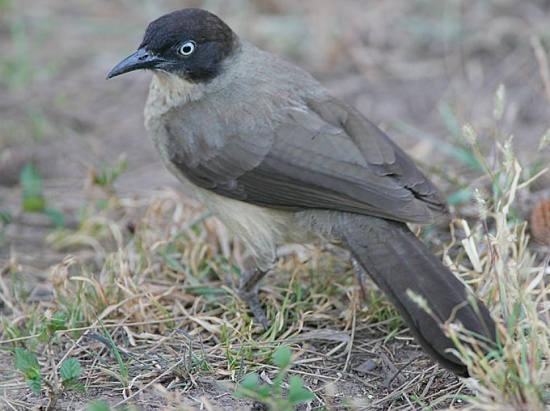(User template. List of References) |
(Photo caption) |
||
| Line 1: | Line 1: | ||
'''Alternative names: Reinwardt's Babbler; Black-eyed Babbler''' | '''Alternative names: Reinwardt's Babbler; Black-eyed Babbler''' | ||
;[[:Category:Turdoides|Turdoides]] reinwardtii | ;[[:Category:Turdoides|Turdoides]] reinwardtii | ||
| − | [[Image:Blackcap_Babbler.jpg|thumb|550px|right|Photo by {{user|Steve+G|Steve G}}]] | + | [[Image:Blackcap_Babbler.jpg|thumb|550px|right|Photo by {{user|Steve+G|Steve G}}<br />Bijilo, [[The Gambia]], March 2005]] |
==Identification== | ==Identification== | ||
With 25 - 26cm a fairly large Turdoides-babbler: | With 25 - 26cm a fairly large Turdoides-babbler: | ||
Revision as of 22:20, 24 May 2010
Alternative names: Reinwardt's Babbler; Black-eyed Babbler
- Turdoides reinwardtii
Identification
With 25 - 26cm a fairly large Turdoides-babbler:
- Blackish hood
- Grey-brown upperparts
- White throat and underparts, spotted on breast
- White eye-ring
- Buff flanks
Distribution
West Africa from Senegal east to Cameroon and Chad, locally also in Central African Republic and Democratic Republic of Congo. Resident species.
Taxonomy
There are 2 subspecies:
- T. r. reinwardtii from Senegal to Mali and Sierra Leone
- T. r. stictilaema from Ivory Coast to Democratic Republic of Congo
Habitat
Gallery forest, thick scrub in open savanna woodland, bamboo groves, tall scrub along streams, parkland, sometimes mangroves. From sea-level to 1000m.
Behaviour
Diet
The diet includes insects and fruit. Forages on ground, flipping falling leaves with bill. Found in small flocks of 6 to 10 birds.
Breeding
It builds a cup shaped nest in dense foliage and 2-3 eggs are laid. Co-operative breeder.
References
- Del Hoyo, J, A Elliott, and D Christie, eds. 2007. Handbook of the Birds of the World. Volume 12: Picathartes to Tits and Chickadees. Barcelona: Lynx Edicions. ISBN 978-8496553422
Recommended Citation
- BirdForum Opus contributors. (2024) Blackcap Babbler. In: BirdForum, the forum for wild birds and birding. Retrieved 25 April 2024 from https://www.birdforum.net/opus/Blackcap_Babbler




